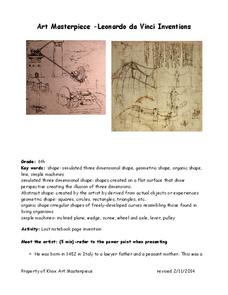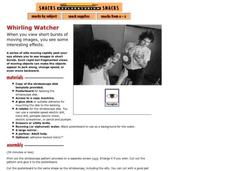Exploratorium
Cylindrical Mirror
Using flexible mirror-like paper, physical scientists experiment with images produced by curving it and looking into its reflective surface. They find that concave mirrors cause reflected light waves to cross and actually flip the image...
Michigan Technological University
Giant Mirrors
Did you know some retailers use curved mirrors in their fitting rooms to make customers look thinner? Pupils view themselves in convex and concave mirrors to understand the difference. The resource includes big ideas for multiple age...
Exploratorium
Parabolas
A parabolic mirror toy demonstrates how concave mirrors objects reflect light and produce a realistic image at their focal point. This resource probably doesn't explain any more than the printed insert that accompanies such an apparatus...
Core Knowledge Foundation
Light and Sound Tell It Again!™ Read-Aloud Anthology
Light and sound are the running themes of a read-aloud anthology. Over three weeks, third graders listen to discuss readings in preparation for completing extension activities. Pupils work through the writing process to compose an...
Curated OER
Reflection and Refraction
What is a prism? A place for light waves that commit minor refractions! The thorough resource includes three hands-on investigations covering light reflection and refraction; mirrors, lenses, and images; and optical systems. Subject...
Exploratorium
Touch the Spring
Concave mirrors and the images they produce are traditional topics in the physics classroom. This resource explains how to set up an investigation of them, and it provides you with the explanation of concepts.
Curated OER
Light and Geometric Optics
It's time to see the light with a unit that focuses on light and geometric optics, including concave and convex mirrors. A variety of experiments, worksheets, and online activities are included.
Exploratorium
Pupil
Give pupils a magnifier, a mirror, and a flashlight so that they can examine their own pupils. As they shine a light on their eyes, the light is shone on how this structure dilates and contracts to control how much is allowed into the...
Math by Design
Transformations – Reflections
Scholars use interactive resources to figure out how to mathematically draw a reflection of a geometric shape viewed in a mirror. To conclude the activity, class members are asked to deduce the result of multiple reflections across...
Exploratorium
Polarized Sunglasses
Reflected waves of light move within a plane, and because of this, polarizing materials can reduce the glare our eyes see. This resource explains how to set up a demonstration of this effect. Consider it for use in your physical science...
Chandler Unified School District
Art Masterpiece—Leonardo da Vinci Inventions
After getting to know the inventor, Leonardo da Vinci and his many inventions, scholars think up their own invention. Following a written description and a hand-drawn picture, learners use a method of mirror writing and antiquing to give...
Exploratorium
Whirling Watcher
Pupils put together their own stroboscopes so that they can observe how cyclically moving images appear to merge into a singular object. This, and several other activities published by the same source, illuminate the way the brain...
Exploratorium
Cheshire Cat
Divide your field of vision in two and see what happens when your two eyes behold two different scenes! This is a way to demonstrate to body-systems buffs how the two eyes usually blend pictures to create a three-dimensional view. This...
International Technology Education Association
Dampen That Drift!
The spacecraft is drifting too far off course! Two games help explain how a spacecraft can use its thrusters to maintain its position. The games have pupils be the components of vectors in order to create and counteract the...
American Institute of Physics
The Black Scientific Renaissance of the 1970s-90s: African American Scientists at Bell Laboratories
A two-part lesson asks young scientists to research the contributions of African American scientists at Bell Laboratories. After presenting their findings, class members watch two demonstrations that introduce them to total internal...














